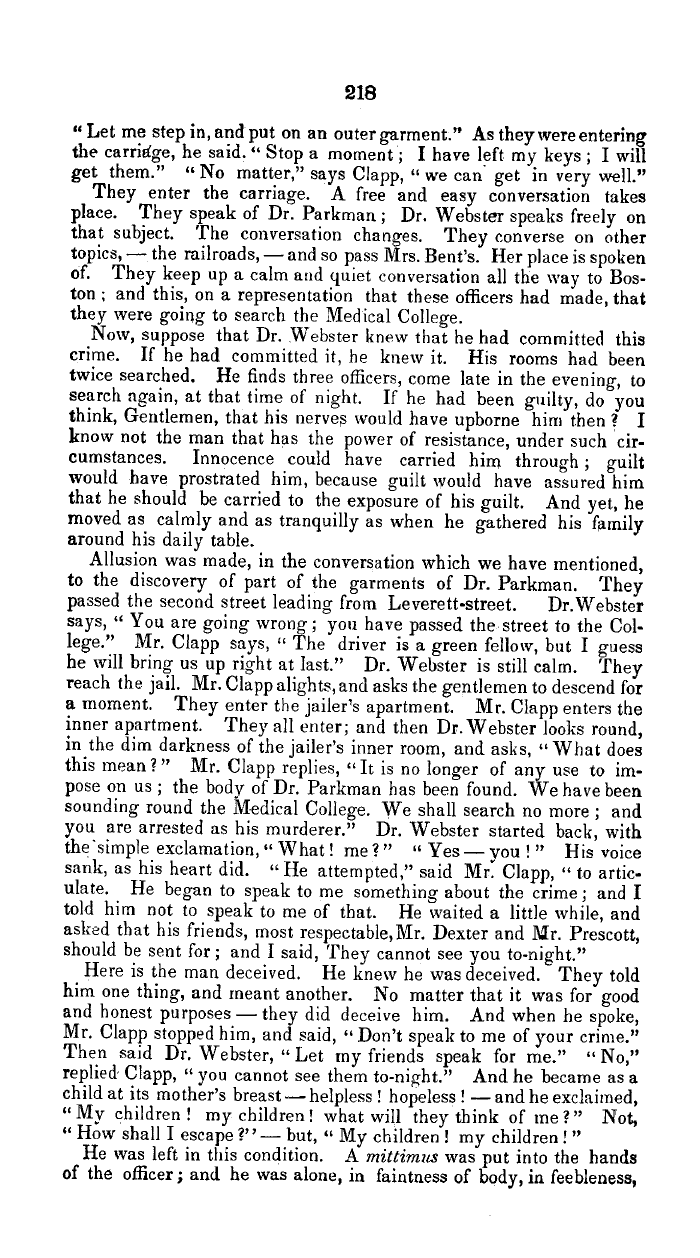|
218
"Let me step in, and put on an outer garment." As they were entering
the carridge, he said. " Stop a moment; I have left. my keys ; I will
get them." '° No matter," says Clapp, '° we can get in very well."
They enter the carriage. A free and easy conversation takes
place. They speak of Dr. Parkman ; Dr. Webster speaks freely on
that subject. The conversation changes. They converse on other
topics, - the railroads, - and so pass Mrs. Bent's. Her place is spoken
of. They keep up a calm and quiet conversation all the way to Bos-
ton ; and this, on a representation that these officers had made, that
they were going to search the Medical College.
Now, suppose that Dr. Webster knew that he had committed this
crime. If he had committed it, he knew it. His rooms had been
twice searched. He finds three officers, come late in the evening, to
search again, at that time of night. If he had been guilty, do you
think, Gentlemen, that his nerves would have upborne him then ? I
know not the man that has the power of resistance, under such cir-
cumstances. Innocence could have carried him through ; guilt
would have prostrated him, because guilt would have assured him
that he should be carried to the exposure of his guilt. And yet, he
moved as calmly and as tranquilly as when he gathered his family
around his daily table.
Allusion was made, in the conversation which we have mentioned,
to the discovery of part of the garments of Dr. Parkman. They
passed the second street leading from Leverett-street. Dr.Webster
says, '° You are going wrong; you have passed the street to the Col-
lege." Mr. Clapp says, '1 The driver is a green fellow, but I guess
he will bring us up right at last." Dr. Webster is still calm. They
reach the jail. Mr. Clapp alights, and asks the gentlemen to descend for
a moment. They enter the jailer's apartment. Mr. Clapp enters the
inner apartment. They all enter; and then Dr. Webster looks round,
in the dim darkness of the jailer's inner room, and asks, '° What does
this mean?" Mr. Clapp replies, °°It is no longer of any use to im-
pose on us; the body of Dr. Parkman has been found. We have been
sounding round the Medical College. We shall search no more ; and
you are arrested as his murderer." Dr. Webster started back, with
the'simple exclamation, 11 What! me? " '° Yes - you ! " His voice
sank, as his heart did. 1° He attempted," said Mr. Clapp, " to artic-
ulate. He began to speak to me something about the crime; and I
told him not to speak to me of that. He waited a little while, and
asked that his friends, most respectable,Mr. Dexter and Mr. Prescott,
should be sent for; and I said, They cannot see you to-night."
Here is the man deceived. He knew he was deceived. They told
him one thing, and meant another. No matter that it was for good
and honest purposes - they did deceive him. And when he spoke,
Mr. Clapp stopped him, and said, " Don't speak to me of your crime."
Then said Dr. Webster, °° Let my friends speak for me." °' No,"
replied- Clapp, °' you cannot see them to-night." And he became as a
child at its mother's breast--helpless ! hopeless! -and he exclaimed,
°' My children! my children! what will they think of me?" Not,
" How shall I escape ?" - but, °° My children ! my children! "
He was left in this condition. A mittimus was put into the hands
of the officer; and he was alone, in faintness of body, in feebleness,
|

